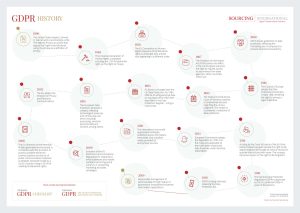Explore Switzerland’s nFADP 2023, a pivotal update in data privacy laws, aligning with EU’s GDPR for enhanced personal data protection.
In today’s digital age, the protection of personal information has become increasingly important. Recognizing this, Switzerland has introduced the new Federal Act on Data Protection (nFADP), which came into effect on September 1, 2023. This new law marks a significant update to Switzerland’s data privacy regulations, aligning them more closely with the European Union’s General Data Protection Regulation (GDPR).
The nFADP represents a critical shift in how personal data is managed in Switzerland. This article aims to provide a clear understanding of the key changes made by the nFADP. We will explore its impact on businesses, individual rights, and the overall digital environment in Switzerland.
Origins and Goals of Data Protection:
Historical Context:
The origins of data protection laws can be traced back to concerns over personal privacy that arose with the advent of computers and digital databases in the mid-20th century. Early data protection efforts were focused on regulating the collection and use of personal data by governments and corporations. The aim was to prevent misuse and ensure that individuals retained some control over their personal information.

Objectives:
The primary goal of data protection laws is to safeguard individuals’ personal data against unauthorized access, use, or disclosure. These laws aim to empower individuals with rights over their data, such as the right to access, correct, and delete their personal information. They also place obligations on organizations that process personal data, requiring them to handle such data responsibly, transparently, and securely. Over time, these laws have evolved to address emerging challenges posed by technological advancements and the global nature of data processing.
Is Data Protection a Burden for Swiss Businesses?
For Swiss businesses, adapting to data protection laws, can initially seem frightening. Implementing comprehensive data security protocols and ensuring legal compliance often requires a significant investment, that can be challenging for small and medium-sized enterprises (SMEs). Swiss companies, just like their European counterparts dealing with the GDPR, might find these requirements complex and costly in the short term. A survey by the International Association of Privacy Professionals (IAPP) highlighted that companies generally invest heavily in meeting data protection standards, including hiring new staff or seeking external guidance.
However, the long-term benefits for Swiss businesses embracing data protection are substantial. Effective data management not only builds consumer trust but also bolsters a company’s reputation. This is particularly important, as data breaches can severely impact both finances and customer confidence. A solid data protection strategy also positions businesses favorably in the global market. For Swiss companies, compliance with nFADP can facilitate smoother interactions with the EU market, as these regulations align with the EU’s GDPR, ensuring easier data transactions across borders.
In essence, while initial efforts to comply with data protection laws might be challenging for Swiss businesses, the enduring advantages of these measures are clear, paving the way for sustainable growth and trust in the digital economy.
Applicability of the New Law to Businesses
Swiss companies, regardless of size, are now required to adhere to the nFADP, which mandates strict management of personal data. This includes adopting measures like data minimization, ensuring data accuracy, and guaranteeing data security. The law is applicable beyond Swiss borders, impacting any business that processes the data of Swiss residents, similar to the GDPR’s extraterritorial reach.
For Swiss businesses, the alignment of the nFADP with GDPR standards is particularly relevant. This harmonization simplifies compliance for companies that operate both in Switzerland and the EU, as they can follow a cohesive set of data protection practices across regions. However, this also means that non-EU companies handling Swiss data must understand and comply with these rigorous standards, which might be more demanding than their domestic laws.
Businesses, from startups to large corporations, must be aware of their responsibilities under this law. This includes not only safeguarding personal data but also respecting individuals’ rights, such as the right to access and rectify their data. Compliance demands resources and adaptation, but it is essential for businesses to maintain credibility and legal standing in today’s data-driven world.
Definitions in Data Protection
Understanding key terms is crucial for businesses navigating Switzerland’s Federal Act on Data Protection (nFADP) or similar European regulations like the GDPR. Here are some essential definitions:
- Personal Data: This refers to any information relating to an identified or identifiable person. Examples include names, identification numbers, location data, or factors specific to the physical, physiological, genetic, mental, economic, cultural, or social identity of that person. Under the nFADP, personal data protection is paramount.
- Sensitive Data: This type of data includes details that are particularly sensitive in nature and require higher levels of protection. Sensitive data encompasses information about an individual’s racial or ethnic origin, political opinions, religious beliefs, union memberships, genetic data, biometric data for unique identification, health data, and a person’s sexual life or orientation.
- Data Processing: This term covers a wide range of operations performed on personal data, whether automated or not. Examples include collection, recording, organization, structuring, storage, adaptation or alteration, retrieval, consultation, use, disclosure by transmission, dissemination or otherwise making available, alignment or combination, restriction, erasure, or destruction of data.
Core principles:
- Principle of Responsibility: Also known as “accountability,” this principle requires that the data controller be responsible for, and able to demonstrate compliance with, all principles of data processing. It implies that businesses must not only adhere to data protection laws but also document and prove their compliance.
- Principle of Legality: This foundational principle asserts that all data processing must be lawful, fair, and transparent. Data must be collected for specified, explicit, and legitimate purposes and not processed in a manner that is incompatible with those purposes.
- Principle of Transparency: Transparency is key in data processing. This principle demands that any information and communication relating to the processing of personal data be easily accessible and understandable. Clear and plain language should be used, ensuring that data subjects are fully aware of how their data is being handled.
These principles form the backbone of modern data protection laws, guiding businesses in their practices and ensuring that personal data is handled with care and respect for individual rights.
Roles in Data Protection:
- Data Controller: The entity that determines the purposes and means of processing personal data.
- Data Processor: A party that processes personal data on behalf of the data controller.
- Data Subject: The individual to whom the personal data belongs.
For businesses, understanding these definitions is critical for ensuring compliance with the nFADP and effectively managing data protection responsibilities.
Legal Bases for Data Processing
In both Switzerland’s nFADP and the EU’s GDPR, there’s a rule that says a company can only use your personal data if they have a good legal reason. One common reason is if they need your information to do something that you’ve agreed to, like fulfilling a contract. Here are a couple of examples to illustrate this:
- Booking a Hotel: Imagine you book a hotel room online. You give the hotel your credit card details and your arrival date. The hotel uses this information to reserve your room and charge you for the stay. Here, they are using your data because it’s needed to complete the booking, which is a contract between you and the hotel.
- Signing Up for a Language Course: Suppose you sign up for an online language course. You provide your email address and some other details. The language school uses this information to set up your account, enroll you in the course, and send you course materials. They need your data to fulfill the agreement (or contract) you made with them when you signed up for the course.
Also, if you’re just asking a company for information before you decide to buy something (like getting a quote for a service), they can use your details to answer your queries. This is part of the steps needed before you actually agree to buy the service or product.
In these examples, the companies are allowed to use your information because it’s necessary for the agreements you have with them, whether that’s buying something or signing up for a service, and even if you haven’t explicitly stated so. They’re not supposed to use your information for anything else that doesn’t relate to your agreement with them unless they have another legal reason.

Special Data Processing Cases
Data protection laws also address special scenarios that require particular attention. Data archiving involves securely storing data for long-term preservation and accessibility. The concept of data deletion or the right to be forgotten is crucial, allowing for the erasure of personal data when it is no longer necessary or upon the withdrawal of consent by the data subject. Protection of minors’ data, especially in the digital context, is given special emphasis, requiring enhanced safeguards. Transferring data across borders, particularly outside Switzerland or the EU, necessitates adherence to stringent legal standards to ensure data protection. Furthermore, the use of personal data for profiling or artificial intelligence applications must respect privacy rights and may require detailed impact assessments to understand the implications on individual privacy.
Data Protection Management Tools
Effective management of data protection within organizations involves a suite of tools and strategies. Comprehensive data protection programs are essential for managing all facets of data protection, from policy formulation to implementation. Regular risk assessments help in identifying and mitigating potential risks to the privacy and security of personal data. Additionally, the implementation of robust security measures is critical to safeguard the confidentiality, integrity, and availability of data.
Security in Data Protection
Ensuring data security involves both technical and organizational measures. Technical measures might include the use of encryption, implementing stringent access controls, and deploying robust network security mechanisms. Organizational measures are equally important and involve establishing policies and procedures to manage data protection effectively. This includes training employees, creating clear data handling protocols, and establishing incident management procedures. These procedures are crucial for responding promptly and effectively to any data breaches or security incidents, including necessary notifications to authorities and affected individuals.
Rights of Data Subjects
The rights of data subjects are a cornerstone of data protection laws. A key right is the right of access, allowing individuals to obtain confirmation as to whether or not their personal data is being processed and, if so, access to that data. The right to rectification enables individuals to have inaccurate personal data corrected and incomplete data completed. Another crucial right is the right to erasure, also known as the right to be forgotten, which permits individuals to have their data deleted under certain conditions, such as when the data is no longer necessary for the original purpose or if the individual withdraws consent. These rights underscore a shift towards greater personal autonomy and control over personal information in the digital age.

Measures and Sanctions in Data Protection
Data protection laws encompass a range of measures and sanctions to ensure compliance and to penalize violations. These can be administrative, civil, or criminal in nature. Administrative measures often include warnings or orders to comply with data subjects’ requests, as well as fines for non-compliance. For instance, under the GDPR, companies can face significant fines for violations, which can be as high as 4% of their annual global turnover or €20 million, whichever is higher. Civil measures may involve compensation for damages suffered by data subjects due to unlawful processing or breach of data protection laws. In severe cases, criminal sanctions, including penalties and imprisonment, can be imposed, especially in cases of intentional violations or severe negligence in handling personal data. These measures and sanctions are crucial in enforcing data protection laws, deterring non-compliance, and protecting individuals’ rights.
Conclusion
In summary, Switzerland’s new Federal Act on Data Protection (nFADP) represents a significant stride in the realm of data privacy, mirroring the robust standards set by the European Union’s GDPR. This law not only enhances the protection of personal and sensitive data but also places a considerable emphasis on the accountability and transparency of data processing practices. Businesses, regardless of their size and scope, are required to adapt to these regulations, ensuring the rights of individuals are upheld while maintaining data integrity and security.
As we navigate through this new era of data privacy, it is imperative for both individuals and businesses to deepen their understanding of these complex and evolving laws. For those keen to explore this subject further and gain a comprehensive insight into data protection in Switzerland, I highly recommend the book available at protectiondesdonnees.guide. This resource provides an extensive overview of data protection practices, legal frameworks, and pragmatic approaches to comply with the nFADP. It serves as an invaluable guide for anyone looking to master the intricacies of data protection and stay abreast of the latest developments in this critical field.
In embracing these new regulations, Switzerland is setting a precedent in data protection that balances individual rights with the operational needs of businesses. By staying informed and proactive, we can ensure a secure, transparent, and trustworthy digital environment for all.




Very interesting article about data protection. I’ve learnt a lot. Thank you for this precise and still short article.
Hey Joel,
I’m happy to hear that you found the article on data protection informative and concise. It’s always my goal to provide valuable insights in a clear and accessible manner. Thank you for your feedback; it’s greatly appreciated!